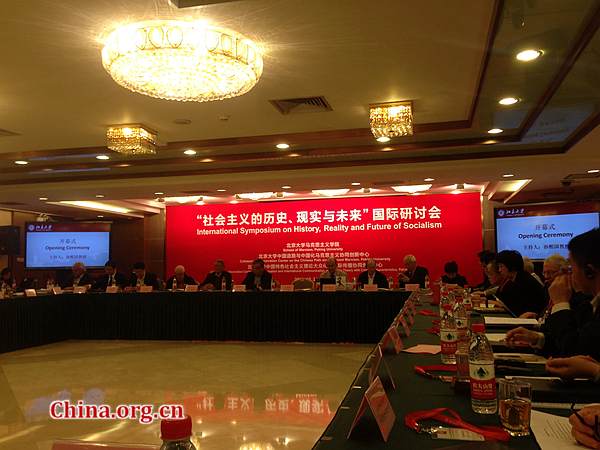Symposium on 100th anniversary of the Russian Revolution
|
|
|
Peking University hosted an international symposium on the history, reality and future of socialism in Beijing on October 21-22, 2017. [Photo courtesy of Heiko Khoo] |
Peking University hosted an international symposium on the history, reality and future of socialism in Beijing on October 21-22, 2017, when Chinese Marxist scholars were joined by colleagues from Europe, Russia, North America and India.
The event considered socialism in the light of the 100th anniversary of the Russian Revolution. And it took place at the same time as the 19th National Congress of the Communist Party of China (CPC).
Speakers covered a very wide range of topics, as socialist ideas and practice have had vast impact on the modern world. Many of the contributions from China focused on contemporary interpretations of socialist ideas within China.
Chinese President Xi Jinping’s sweeping overview of modern socialism presented at the 19th CPC National Congress located the origin of socialism in Thomas More’s book Utopia.
This provided a valuable backdrop for several Chinese scholars to elaborate a framework for categorizing phases in the history of concepts of socialism. These were related to the development of contemporary interpretations of “socialism with Chinese characteristics.”
The Chinese Marxist scholars devoted considerable attention to the main contradiction, which dominated the fate of the Soviet Union in its early years. According to Karl Marx’s theory, socialism was to begin only after capitalism had been fully developed.
However, Lenin’s revolution established a socialist government in a backward society dominated by individual production and pre-capitalist economic formations. All the trials and tribulations which shaped the fate of socialist governments after 1917 were determined by this contradiction.
Prof. An Qinian, from the philosophy department of the Renmin University of China, offered a broad overview of the consequences of the contradictions, through which the material backwardness of the Soviet Union generated attempts to leap over capitalism.
And therefore, despite Vladimir Lenin’s initial post-revolutionary support for democratic structures of power, emulating the experience that Marx observed at the time of the Paris Commune in 1871 – such as all officials receiving the same wage as workers – material backwardness automatically produced cultural backwardness.
However, Yan Zhimin from the School of Marxism at Peking University pointed to a flaw in Marx’s own thought on the question as revealed in an 1881 letter to Vera Zassulich in Russia. In this letter, Marx suggested that primitive communal forms of Russian agriculture might act as a springboard to jump from backwardness to communism, without any intermediate phases, provided a workers’ revolution led the way.
Prof. Yu Liangzhao from the School of Marxism at Nanjing Normal University explained how Lenin approached the question after 1921, during the development of the New Economic Policy in the Soviet Union.
A transitional period, when communists “learn to trade,” engage in competition and supervise the activity of capitalists, would be required, while maintaining proletarian power.
Lenin believed that the Soviet revolution would spread internationally. This question was addressed by Balwinder Singh Tiwana from India’s Punjab University. He looked at the impact of the Russian Revolution on communists in the Indian independence movement from 1920 onwards.
David Laibmann from New York University, editor of the Marxist journal Science and Society, examined the question of systemic planning and economic coordination, and how the Soviet system established its internal economic equilibrium.
He recognized that the sense of urgency, haste and rush caused by material backwardness acted to severely restrict the degree of participation, and the necessary evaluation of planning and control procedures; and this produced many fundamental systemic contradictions.
However, the discussions were not restricted to historical analysis, important as these questions are to inform the present. For example, Josef Baum from Vienna University addressed the need to embed ecological questions in any contemporary vision of socialism.
And Alexander Buzgalin from Moscow State University, which houses one of the few Marxist study centers left in Russia, invited participants to look at the nature of revolution, above and beyond the question of a seizure of State power, and the development of the forces of production.
He suggested that revolution should be considered from the standpoint of overcoming human alienation and unleashing mass social creativity.
Unfortunately, the participants who presented papers restricted the scope for elaborating concepts and arguments in depth. However, the discussions will continue at the global Marxism seminar to be held on the 200th anniversary of Marx’s birth in May 2018.
